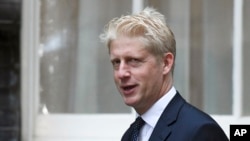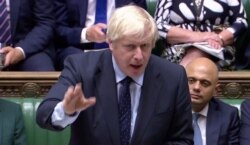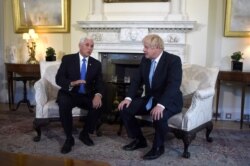Updated: September 5, 2019, 2:52 p.m.
British Prime Minister Boris Johnson continued to push Thursday for an early general election, despite several defeats in parliament and the sudden resignation of his brother from his post as a junior minister and from parliament.
During a speech in Yorkshire, Johnson maintained a snap election must be held so voters can decide whether to leave the European Union on Oct. 31 with or without an agreement.
When asked if he would ask the European Union to extend the Brexit deadline, Johnson said, "I'd rather be in a ditch," adding that a delay "achieves absolutely nothing."
The prime minister accused his political opponents of supporting legislation that would "scupper our negotiating power" and surrender "the powers of the British people" to the EU.
Johnson's remarks came just hours after his brother tweeted that his resignations were due to conflicts between family and Britain.
"In recent weeks I've been torn between family loyalty and the national interest — its an unresolvable tension; time for others to take on my roles as MP (Member of Parliament); Minister," Jo Johnson said.
It was not clear if Jo Johnson would leave parliament immediately or not seek reelection.
His resignation follows his brother's recent expulsion of 21 lawmakers from the Conservative Party, which remains divided over the prime minister's strategy to withdraw from the European Union on Oct. 31 with or without an agreement.
Boris Johnson was dealt another setback Wednesday when the House of Commons voted in favor of a measure forcing the government to ask the EU to delay Brexit another three months if there is no exit deal by Johnson's Oct. 31 deadline.
This was Johnson's third major Brexit defeat in two days.
The measure now goes to Parliament's upper chamber, the House of Lords, where pro-Brexit lawmakers are planning to defeat it by filibustering.
A number of Conservatives joined opposition lawmakers Tuesday in voting to seize the Brexit matter from Johnson.
The prime minister says lawmakers have taken away his ability to negotiate with the EU.
"It's therefore a bill without precedent in the history of this house, seeking as it does to force the prime minister with a pre-drafted letter to surrender in international negotiations," Johnson said Wednesday.
"I refuse to do this ... this house has left no other option than letting the public decide who they want as prime minister."
Johnson says he will propose Oct. 15 as the date for a new election, but it is uncertain whether the motion will pass. He would need the backing of two-thirds of Britain's 650 members of Parliament to trigger a poll.
The prime minister met Thursday at 10 Downing Street with U.S. Vice President Mike Pence. During a visit Tuesday in Dublin with Irish Prime Minister Leo Varadkar, Pence said the U.S. supports Britain's decision to leave the EU and urged the other member nations to "negotiate in good faith" with Britain. Pence told Johnson during their meeting the U.S. is ready to negotiate a free-trade agreement with the UK.
On Wednesday, U.S. President Donald Trump expressed confidence in Johnson, saying "he knows how to win." He added, "Don't worry about him. He's going to be OK."
British economists say leaving the EU without a deal would create havoc to the British economy and possibly bring on a recession.
Even if lawmakers succeed in thwarting Johnson, the Brexit endgame is far from over. An election sometime this year may be the most likely outcome of the arcane parliamentary maneuvers this week, one that could see Britain's storied Conservative Party split, with several former ministers, including a former deputy prime minister, forming a breakaway independent Conservative Party.
It isn't often that opposition parties seek to avoid a general election, but on Monday, Johnson's rivals met and agreed to make as their priority the passing of legislation to prevent a so-called no-deal Brexit, rather than trying to oust the country's minority Conservative government and trigger an election.
Pro-EU lawmakers, and others who fear the economic damage of a no-deal Brexit, say Johnson could subsequently shift the election to after Oct. 31, the date for Britain to leave the EU without a deal. That would snatch from the Commons the chance to thwart him by asking Brussels to extend the so-called Article 50 deadline set for Britain to relinquish membership of the EU.
Jeremy Corbyn, leader of the main opposition Labor Party who previously had wanted an early election, has also signed on to the unity move by the other opposition parties and Conservative rebels, saying, "We are working together to stop this government crashing out on the 31st of October."











